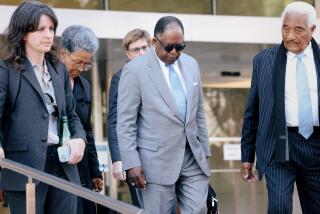Sympathy for Parents May Derail Jury Verdict in Deprogramming Trial : Court: Judge might be asked to issue a verdict under a rare court procedure. The possibility has sent lawyers scurrying to research the provision.
- Share via
The possibility that one or more jurors in the Ginger Brown deprogramming trial in Vista may be too sympathetic to the woman’s parents to find them guilty of kidnaping her--and that the judge would ultimately be asked to issue a verdict himself under a rare court procedure--was raised Tuesday as the jury finished its third day of deliberations in unusual fashion.
In an unusual, open-court hearing that suggested several areas of apparent debate within their ranks, jurors asked Superior Court Judge David B. Moon Jr. to better define some legal terms. The controversial case involves parents accused of kidnaping their adult child in an unsuccessful deprogramming attempt.
The most interesting question--of how to reconcile sympathy toward the parents with applying the letter of the law--was put in writing from one juror to Moon, who then showed it privately to the attorneys in the case but deferred discussion until 10 a.m. today.
Defense attorneys said outside the courtroom that the juror asked what to do if he agrees there was a technical violation of the law, but his conscience won’t allow him to convict the defendants because of sympathy for them.
Herb Weston, one of the defense attorneys, said it seemed to him the juror was leaning toward acquiting the defendants because they had a good motive to abduct Ginger Brown from the small religious group known as Great Among the Nations--even though Moon had previously ruled that good motive is not a defense in this case.
Deputy Dist. Atty. Gary Rempel complained that the jury seems to be affected by sympathy and, as a result, is not deliberating on the legal facts of the case.
“It’s clear that sympathy has been allowed to find its way into the jury room,” Rempel said. “They’re forgetting about sympathy for these institutions that keep us free. The only thing that would have kept them from coming back with a verdict yesterday (Monday) was sympathy for the defendants.”
One possible resolution of the sympathy issue was raised by Moon: that he might authorize a so-called “special verdict,” in which the jurors are asked simply to find whether or not the various requisite elements of the charged crimes are found to exist in this particular case. If the jurors procedurally agree that each of the necessary elements for conviction exist, they can stop short of finding the defendants actually guilty and let the judge make that ultimate finding himself.
Attorneys in the case said they had not heard of the special verdict protocol being used in recent years in the Vista courthouse, and one of the defense attorneys quickly left the courtroom to begin his research in that somewhat obscure area of trial law.
Rempel told Moon he would endorse the use of the special verdict procedure. The defense attorneys each objected to it, and Moon said he would decide today whether to authorize it.
Attorneys said the use of a “special verdict” might allow jurors otherwise sympathetic to Brown’s parents to essentially convict them of the charges without themselves directly finding the defendants guilty.
Rempel said he had never before heard of a trial where a special verdict was utilized by a judge.
“Let’s say you believe someone committed all of the elements (of the crime) but you just can’t get it out of your mouth to say, ‘He’s guilty.’ Well, you let the judge say it for you. He asks you, ‘Is this element proven? Is that element proven?’ He goes right down the list. When they say ‘Yep’ to each of those, there is a special verdict. He, the judge, says, ‘I find the defendant guilty.’ ”
Attorneys for both sides said the jurors do not know that the “special verdict” alternative is available to them, although Moon and the attorneys had previously discussed that option in chambers.
Jurors also asked Moon in court Tuesday to reread the definition of “reasonable doubt” and to elaborate on the definition of “consent.” Much of the defense case hinges on its theory that Ginger Brown baited her parents to abduct her from Great Among the Nations so that she could later sue them for monetary damages.
“Some of us are focusing on the question, ‘Is there reasonable doubt that the movement (of being taken from an Encinitas parking lot to Escondido) was without consent?’ ” the jurors asked Moon in a handwritten note. The note added: “Is this equivalent to, ‘Is there a reasonable possibility the movement was with consent?’ ”
Moon told the jurors that it was the prosecution’s burden to prove beyond a reasonable doubt that Brown, 22 at the time, did not consent to being abducted and held for five days in an Escondido home where the unsuccessful deprogramming effort occured.
Another juror asked whether, if Ginger Brown was taken under duress or by threat, “does it follow that consent wasn’t present?”
That question led Moon to offer to the jury a hypothetical analogy in which a teen-ager takes the family car without his parents’ implied or explicit permission. But Moon’s example left the attorneys on both sides shaking their heads in apparent confusion. After the jury was dismissed and returned to their deliberations room, each of the attorneys asked Moon not to provide extemporaneous legal analogies without first running them by them for their concurrence.
After the jury was out of earshot, Moon offered: “This jury is struggling with certain legal concepts.”
Charged with kidnaping, false imprisonment and battery are the woman’s parents, Earle and Dorothy Brown, both 58, of Santa Cruz; an older sister, Holly Brown, 25; Cliff Daniels, 35, the deprogrammer, and Hank Erler, 23, in whose mother’s home the deprogramming attempt was made.
The defendants said they took Ginger Brown from the group because they believe it is a cult whose members have been influenced by their leader, Benjamin Altschul, to finance his comfortable life style under the guise of “love offerings.”
Group members say Great Among the Nations is simply a close-knit, fundamental Christian Bible study and evangelistic ministry.
More to Read
Sign up for Essential California
The most important California stories and recommendations in your inbox every morning.
You may occasionally receive promotional content from the Los Angeles Times.













